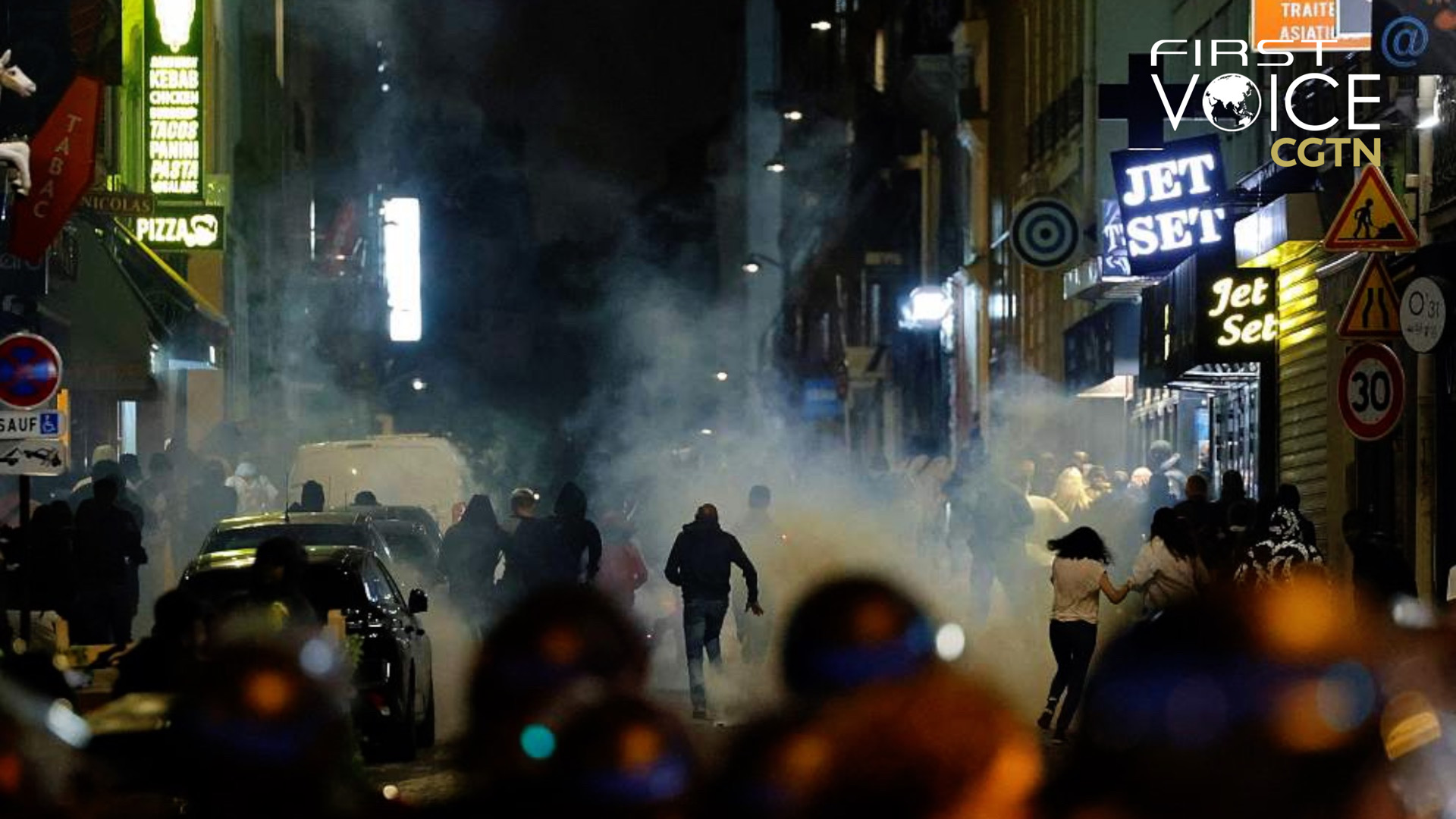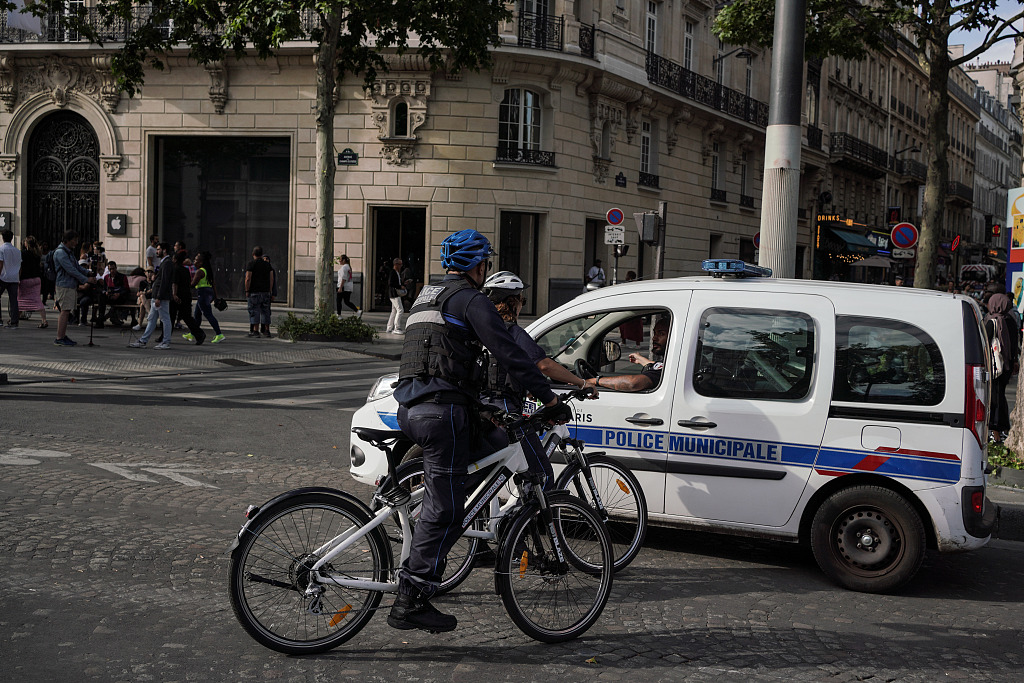
Editor's note: CGTN's First Voice provides instant commentary on breaking stories. The column clarifies emerging issues and better defines the news agenda, offering a Chinese perspective on the latest global events.
Since the tragic death of 17-year-old teenager of North African descent Nahel M. at the hand of a police officer on June 27, France has been drowned in disarray and violence. At least 719 people were arrested in one night. More than 700 shops, supermarkets, restaurants and bank branches were "ransacked, looted and sometimes even burnt to the ground" in several days. 2,000 vehicles were torched. Over 200 police officers were injured. 45,000 police personnel have been dispatched across the country.
Even tourists weren't spared. A bus carrying 41 Chinese tourists was attacked in Marseille last Friday by black-clad rioters. The windshield was shattered. A tourist on board said that the rioters tried to board the bus and pull the passengers out. According to the group's recount of the incident, they called the local police afterwards and the police replied that the rioters were actually attacking nearby police officers and "happened to encounter the passing bus, and then attacked the bus." The Chinese Consulate-General in Marseille called the police to provide urgent assistance for the tourists and requested negotiations with the French authority to ensure the safety of the Chinese citizens and their property.
Was peace unsupported? No. On the contrary, Nahel's grandmother was one of the those who appealed for calm. She said to the media that the rioters needed to stop rioting and destroying. "Do not smash windows, attack schools and buses. Stop. It's mothers who take those buses," she said, according to The Guardian's report.
The sad truth is that Nahel's death was the trigger, but not the root cause of this situation. The response by the United Nations High Commissioner for Human Rights to Nahel's death included sharp criticism for the French authority. "This is a moment for the country to seriously address the deep issues of racism and discrimination in law enforcement," the statement read. In 2017, a human rights group in France released a study showing that "young men perceived as Black or Arab" are 20 times more likely to be stopped and checked by the police. Journalist and activist Rokhaya Diallo told CNN that "many young people in the suburbs, in the poorest neighborhoods, those whose parents in Paris are immigrants (from) Africa, the Caribbean and also Asia, know they are the first target of police brutality."

Police presence on the Champs-Elysees avenue on July 2, 2023 in Paris, France. /CFP
Police presence on the Champs-Elysees avenue on July 2, 2023 in Paris, France. /CFP
Daniele Obono, a lawmaker from the Unbowed party in France, said "we are talking about people who have been in France for 100 years or half a century, but are still considered foreigners, strangers foreign to France, even though they are French citizens."
But in recent years, the number of actual "foreigners" in France has grown. On March 30, the first study in immigration in a decade by France's national statistics agency INSEE was published. It shows that in 2021, one-tenth of people living in France – almost seven million people –were not born in France. 6.5 percent of French residents came from abroad in 1968.
However, public opinion doesn't seem to be so welcoming. The Consumer Science & Analytics (CSA) Institute conducted a poll in late 2022 showing that only 13 percent of French think migrants represent an "opportunity" for the country. 38 percent see them as a "threat." Its poll in April, 2023 showed that 82 percent of French favor immigration laws that facilitate deportations.
Piling onto the tension surrounding race and identity is the economy. While the current French government is targeting 1 percent growth this year, INSEE's prediction in June was only 0.6 percent. Bloomberg has reported that the French economy probably saw a 0.5 percent contraction in the second quarter this year. And despite slowing inflation, France's inflation rate remained "substantially higher" than its neighbors, according to a Wall Street Journal report on June 30.
While the new unrest is attracting global attention, it's important to remember that for the better part of the first half of 2023, France has been hit by nationwide demonstrations and protests against the government's decision to raise the retirement age. During this period, France has seen hundreds of thousands of protesters take to the streets in a single day. In March, polls showed 71 percent of French people wanted the government to resign.
Existing racial tensions, economic problems and mass dissatisfaction against the current government rolled into one created the perfect condition for a firestorm that only needed one spark for it to sweep across the country. Nahel was that spark. But the chaos that's engulfing France now requires more for it to be quelled.
(If you want to contribute and have specific expertise, please contact us at opinions@cgtn.com. Follow @thouse_opinions on Twitter to discover the latest commentaries in the CGTN Opinion Section.)